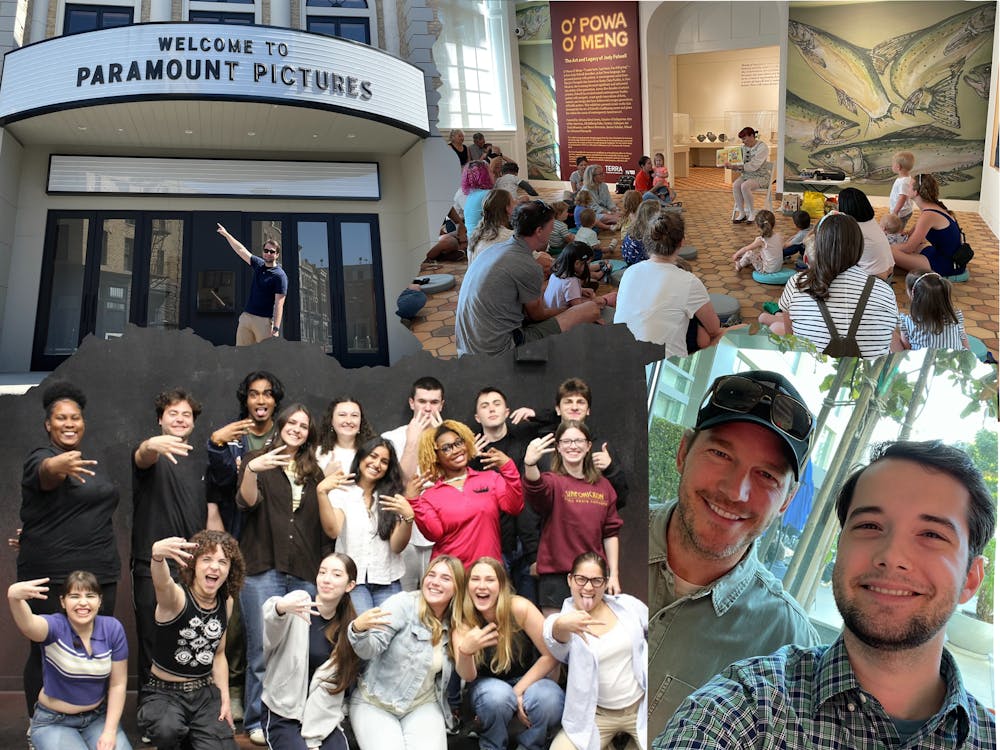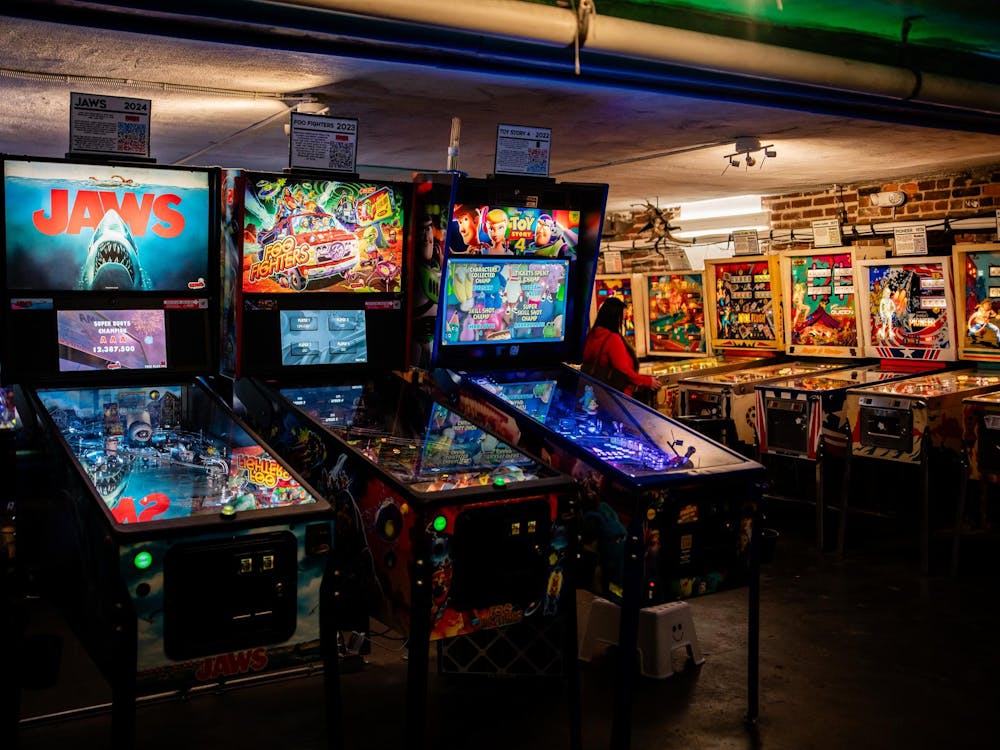Coast to coast, overseas and rooted on Grounds, three current students and one recent graduate have used this summer to unearth their places in the arts. The zeal among students in the University’s arts scene doesn’t fade over the three-month academic break — it carries itself into opportunities wherever they can be found.
Discovering that creative careers often reach far from home and far from ideas of traditional artistic roles, these four shared how the arts have shaped their summers — and how their summers may shape their futures. For third-year Education and College student Carlin Lacques, that discovery reframed her perspective on what it meant to work in the arts.
“In my mind, it was always like, ‘to work in the art world, you have to be an artist,’ but that's not the case.”
Art: Framing a professional summer
Professional openings in art go far beyond the canvas and studio. Museums, as bridges between artistic vision and public understanding, encompass the side of art that prompts education, cultural stewardship and meticulous curation.
Lacques found an opportunity on Grounds this summer as an education intern at the Fralin Museum of Art. As a double major in Youth and Social Innovation and Spanish, she views the internship as a foundation for a future in spaces where art, youth engagement and public service intersect.
“There's a lot more out there than people realize in terms of arts career paths. I enjoy working in public spaces like museums and libraries — they’re very interesting to me in that they serve the public as hubs of education,” Lacques said
One of her primary responsibilities as an intern is to prepare for the annual "Writer’s Eye” competition, the Fralin’s ekphrastic writing contest. Lacques and her fellow summer interns draw up historical, artistic and contextual research documents on submissions of poetry and prose inspired specifically by the museum’s selected works, observed on guided tours. She additionally supports the museum’s general summer programming in-person, leading events such as "Pictures and Pages", where children ages two to five read, observe and create art accompanied by their parents.
Her work at the museum will continue well after the summer. During the academic year, Lacques volunteers as a docent — an interactive tour guide.
Initially, she found the formal atmosphere of museums intimidating, as if she was “supposed” to interact with art in a narrow, intellectual way. This was until she took the engagement course “Art In and Out of Place” with Assoc. Prof. Christa Robbins that reframed art as an expansive and personal experience.
“You don't have to have a certain level of intelligence or particular worldview to engage with art. Just being a person is enough."
Theater: Even in summer, the show must go on
A complete theater production requires creative and technical talents with each carrying out tasks essential to craft a moving experience. For two current students at the University, theater’s multifaceted nature has opened doors to professional summer opportunities spanning different parts of the globe and different parts of the art form itself.
Third-year Engineering student Will Conrad’s ardor for theater and artistic lighting has mapped out an expansive summer journey in the United Kingdom, where he will study abroad in London and later work as a theater technician and lighting designer in Edinburgh, Scotland.
“The reason why I love theater so much, specifically lighting, is because it's all problem solving … Every new thing you want to do is a new problem and you have to figure out a clever way to get it done,” Conrad said.
Conrad, an electrical engineering major, is drawn to the technicality of stage design, now working in preparation of the world’s largest arts festival, the Edinburgh Fringe. The Fringe festival hosts over four thousand shows in a mishmash of venues around Scotland’s capital every August.
Amidst the more familiar stages of Charlottesville, he has applied his skills in stage design in plays with the University’s drama department, student-run theater groups and, importantly, the community theater “Live Arts.”
In partnership with educational travel company WorldStrides, Live Arts annually assembles a team of designers and technicians to prepare makeshift venues in Edinburgh ahead of the festival. Conrad, whose team will build a fully-equipped theater inside a church, said he was excited to be a part of the behind-the-scenes efforts to create these performance locales as well as the connections fostered from it.
“We're going to be working with some really talented people who do lighting and theater in Edinburgh, and I'm so excited to pick their brains about their work,” Conrad said.
Across the Atlantic, third-year College student Carson Harter found that their path to professional growth in the arts led directly to the heart of American theater — New York City. In Manhattan’s financial district, Harter is attending an intensive nine-week theater conservatory at the Stella Adler Studio of Acting. Harter’s desire to envelop themself in New York’s acting scene — despite its unpredictability — stems from a passion for theater which has manifested itself into enrollment at the summer conservatory.
“I've loved theater since middle school, and theater, especially acting, is inherently an unstable field to go into,” Harter said. “Whenever I get a chance to meet someone, I take it, because you never know when it might be helpful.”
Both students’ summer opportunities were suggested by connections made right on Grounds. Harter, as the lead in a play put on by the drama department titled “Love is the Greater Labyrinth,” grew close to a guest director who worked in New York City. Through that, they received suggestions and guidance on which programs to apply to in the competitive world of theater conservatories.
Harter and Conrad’s summer pursuits have been stepping stones in their professional careers in the arts. Harter aims to return to New York next summer and post-graduation to further lay the foundation of their budding acting career, while Conrad aims to continue in practical theater design.
“The hope is that I can go into a career where I work on shows to make really pretty things while having a concrete understanding of how they work,” Conrad said. “There's a whole world out there with what I could apply it to.”
Media: Behind the summertime scenes, literally
Within weeks of leaving Charlottesville to finish his final semester remotely, Class of 2025 alumnus John Barnes found himself eagerly embedded at the core of Hollywood’s media landscape. Barnes has spent June wrapping up a five-month position as a 20th Television Studio production intern at Disney in Los Angeles.
Throughout the internship, Barnes’ responsibilities ranged from logistic work in building up a new database for Disney, to assisting on- or off-set in production for TV shows such as “Jimmy Kimmel Live,” “Criminal Minds” and “Nobody Wants This.” Barnes said that he found help in securing the rare opportunity via an unexpected networking pipeline — a kickball league.
“It seemed so out of the realm of possibility after four years of applying to major studios and hearing from so many that they had applied [to] and never heard back,” Barnes said. “One summer, I joined an adult kickball league … and a friend I made told me I should put him down as a reference because he worked at Disney. That's the first time I got an interview.”
Inspired by a deep-rooted love of film and television, Barnes double majored in drama and media studies with a concentration in film. He brought that enthusiasm to life on Grounds during his time as the president of the Filmmakers Society. In the role, he hoped to offer members comprehensive industry exposure — the kind of exposure that had opened doors for him in California — through guest speakers with careers in filmmaking.
“In this internship, I've learned about so many jobs that you would have never known existed if you were just in class,” he said. “There are so many different things that go into a show, from budgets, to paperwork, to tracking progress.”
Barnes hopes to continue his involvement in television production, aiming for the on-set experience that he discovered many in studio roles at Disney previously held. While diving deeper into Hollywood’s creative sphere, he aspires to gradually work towards his goal of becoming a storyteller in his own right.
“I like to write in my free time, and I do think my end goal is to work as a writer or director in film or TV,” Barnes said. “I feel really fulfilled already, seeing the macro view of all these different shows, different stages of production and being in that environment.”
Whether it is building theaters or acting in them, running museum programs or assisting on TV sets, Conrad, Harter, Lacques and Barnes all share one undeniable trait — the passion for the arts that led them there. Their diverse summer experiences highlight the expanding opportunities available to those hopeful to meet passion with profession in today’s arts industries.







